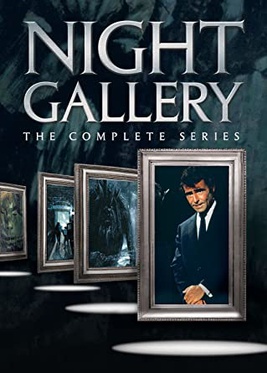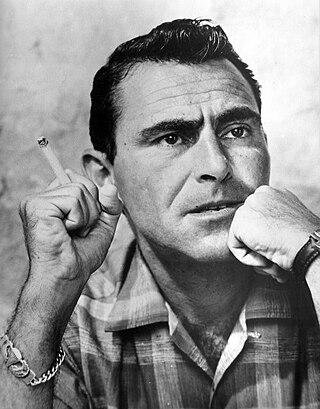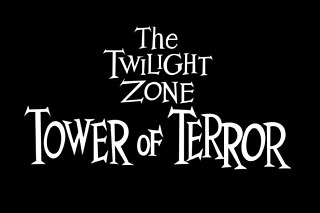Related Research Articles

The Twilight Zone is an American media franchise based on the anthology television series created by Rod Serling in which characters find themselves dealing with often disturbing or unusual events, an experience described as entering "the Twilight Zone". The episodes are in various genres, including fantasy, science fiction, absurdism, dystopian fiction, suspense, horror, supernatural drama, black comedy, and psychological thriller, frequently concluding with a macabre or unexpected twist, and usually with a moral. A popular and critical success, it introduced many Americans to common science fiction and fantasy tropes. The first series, shot entirely in black-and-white, ran on CBS for five seasons from 1959 to 1964.

Night Gallery is an American anthology television series that aired on NBC from December 16, 1970, to May 27, 1973, featuring stories of horror and the macabre. Rod Serling, who had gained fame from an earlier series, The Twilight Zone, served both as the on-air host of Night Gallery and as a major contributor of scripts, although he did not have the same control of content and tone as he had on The Twilight Zone. Serling viewed Night Gallery as a logical extension of The Twilight Zone, but while both series shared an interest in thought-provoking dark fantasy, more of Zone's offerings were science fiction while Night Gallery focused on horrors of the supernatural.

Rodman Edward Serling was an American screenwriter and television producer best known for his live television dramas of the 1950s and his anthology television series The Twilight Zone. Serling was active in politics, both on and off the screen, and helped form television industry standards. He was known as the "angry young man" of Hollywood, clashing with television executives and sponsors over a wide range of issues, including censorship, racism, and war.

"Where Is Everybody?" is the first episode of the American anthology television series The Twilight Zone and was originally broadcast on October 2, 1959, on CBS. It is one of the most realistic Twilight Zone episodes, as it features no supernatural elements and is based on fairly straightforward extrapolation of science.
"Walking Distance" is episode five of the American television series The Twilight Zone. It originally aired on October 30, 1959. The episode was listed as the ninth best episode in the history of The Twilight Zone by Time magazine.
"I Shot an Arrow into the Air" is the fifteenth episode of the American television anthology series The Twilight Zone.
"The Fever" is the seventeenth episode of the American television anthology series The Twilight Zone. It originally aired on January 29, 1960, on CBS. The complete, original text for this story was run in the debut issue of Harvey Kurtzman’s Help!, cover dated August, 1960.
"The Purple Testament" is the nineteenth episode of the American television anthology series The Twilight Zone. It is "the story of a man who can forecast death". It originally aired on February 12, 1960, on CBS.
"Eye of the Beholder" is episode 42 of the American television anthology series The Twilight Zone. It originally aired on November 11, 1960, on CBS.
"The Night of the Meek" is episode 47 of the American television anthology series The Twilight Zone. It originally aired on December 23, 1960, on CBS. It was one of the six episodes of the second season which were shot on videotape in a short-lived experiment aimed to cut costs.
"Little Girl Lost" is episode 91 of the American television anthology series The Twilight Zone. It is about a young girl who has accidentally passed through an opening into another dimension. Her parents and their friend attempt to locate and retrieve her. It is based on the 1953 science fiction short story by Richard Matheson. The title of the episode comes from a poem by William Blake, from his collection Songs of Innocence and of Experience.

The Twilight Zone Tower of Terror, or simply Tower of Terror, is a series of similar accelerated drop tower dark rides located at Disney's Hollywood Studios, Tokyo DisneySea, Walt Disney Studios Park, and formerly located at Disney California Adventure. The attraction is inspired by Rod Serling's anthology television series, The Twilight Zone, and takes place in the fictional Hollywood Tower Hotel in Hollywood, California. The Tokyo version features an original storyline not related to The Twilight Zone and takes place in the fictional Hotel Hightower. All versions of the attraction place riders in a seemingly ordinary hotel elevator, and present a fictional backstory in which people have mysteriously disappeared from the elevator under the influence of a supernatural element many years previously.

The Twilight Zone is an American anthology television series which aired from September 27, 1985, to April 15, 1989. It is the first of three revivals of Rod Serling's acclaimed 1959–64 television series, and like the original it featured a variety of speculative fiction, commonly containing characters from a seemingly normal world stumbling into paranormal circumstances. Unlike the original, however, most episodes contained multiple self-contained stories instead of just one. The voice-over narrations were still present, but were not a regular feature as they were in the original series; some episodes had only an opening narration, some had only a closing narration, and some had no narration at all. The multi-segment format liberated the series from the usual time constraints of episodic television, allowing stories ranging in length from 8-minutes to 40-minute mini-movies. The series ran for two seasons on CBS before producing a final season for syndication.
The Twilight Zone is a nationally syndicated radio drama series featuring radio play adaptations of the classic 1959–1964 television series The Twilight Zone. The series was produced for the British digital radio station BBC Radio 4 Extra airing for 176 episodes between October 2002 and 2012. In the United States, it aired on nearly 200 radio stations including WCCO, KSL, KOA, WIND, XM Satellite Radio channel 163 and Sirius XM Book Radio. Most of the stations aired two episodes each week, usually on the weekends and many times back to back.

The Twilight Zone is an American fantasy science fiction horror anthology television series created and presented by Rod Serling, which ran for five seasons on CBS from October 2, 1959, to June 19, 1964. Each episode presents a standalone story in which characters find themselves dealing with often disturbing or unusual events, an experience described as entering "the Twilight Zone", often with a surprise ending and a moral. Although often considered predominantly science-fiction, the show's paranormal and Kafkaesque events leaned the show much closer to fantasy and horror. The phrase "twilight zone" has entered the vernacular, used to describe surreal experiences.

The Twilight Zone is a science fiction horror anthology television series, presented by Forest Whitaker. It is the second of three revivals of Rod Serling's original 1959–64 television series. It aired for one season on the UPN network, with actor Forest Whitaker assuming Serling's role as narrator and on-screen host. It was a co-production between Spirit Dance Entertainment, Trilogy Entertainment Group, Joshmax Productions Services, and New Line Television. It premiered on September 18, 2002, and aired its final episode on May 21, 2003.

The Outer Limits is an American television series that was broadcast on ABC from September 16, 1963, to January 16, 1965, at 7:30 PM Eastern Time on Mondays. It is often compared to The Twilight Zone, but with a greater emphasis on science fiction stories. It is an anthology of self-contained episodes, sometimes with plot twists at their ends.
The second season of The Twilight Zone aired Fridays at 10:00–10:30 pm (EST) on CBS from September 30, 1960 to June 2, 1961. There are 29 episodes.
The third season of The Twilight Zone aired Fridays at 10:00–10:30 pm (EST) on CBS from September 15, 1961 to June 1, 1962. There are 37 episodes.
The fourth season of The Twilight Zone aired Thursdays at 9:00–10:00 pm on CBS from January 3 to May 23, 1963.
References
- ↑ "Visions from the Twilight Zone" by Arlen Schumer, ISBN 0877016828
- ↑ "episode list". TV.com.
- ↑ "TV Guide's Top 100 Episodes". Rev/Views. June 17, 2009. Retrieved July 4, 2016.